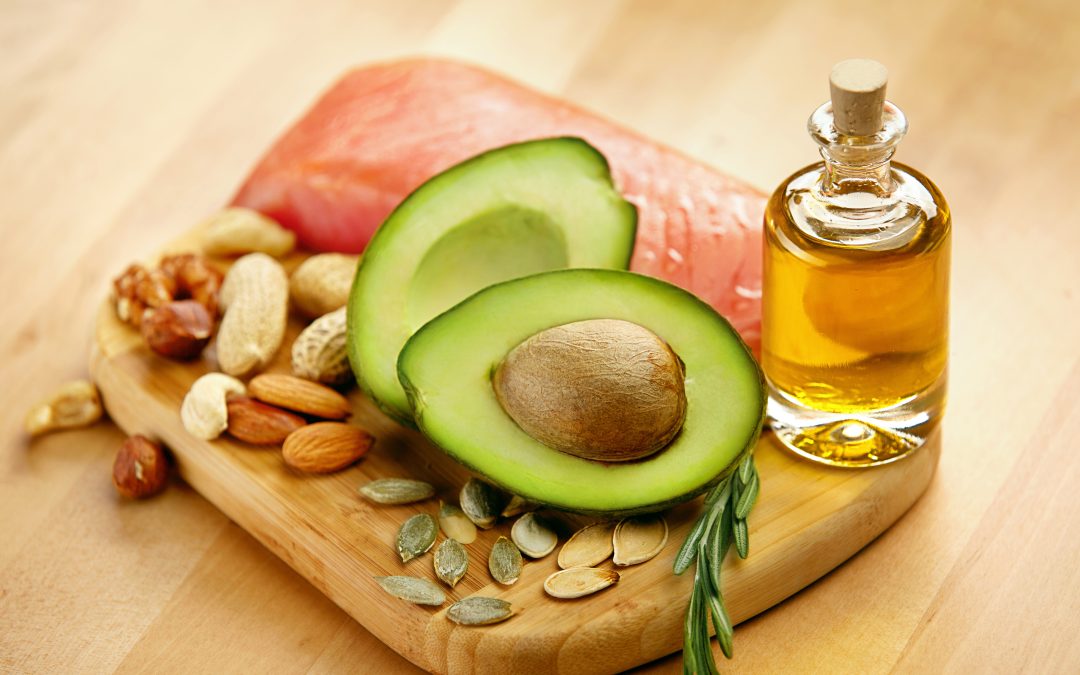WHAT IS DIETARY FAT?
The chief concern with dietary fat has been their role with promoting or protecting against coronary artery disease (heart disease).
There are 4 major dietary fats in food:
- Saturated Fat – these are usually solid at room temperature.
- Trans Fat – low levels of trans fatty acids occur naturally in some foods especially dairy and meats from ruminants such as cows, sheep, and goats. However, much higher levels of trans fatty acid consumption can occur because of the industrial partial hydrogenation of unsaturated fatty acids.
- Monounsaturated fat – are typically liquid at room temperature but start to turn solid when chilled. Olive oil is rich in monounsaturated fats.
- Poly unsaturated fat – are typically liquid at room temperature but start to turn solid when chilled. Olive oil contains poly unsaturated fats. Oils rich in PUFA also contribute vitamin E, a much-needed antioxidant to the diet. PUFA are essential fats needed for many important functions in the body but cannot be produced by the body and so must be obtained from food.
HOW DOES DIETARY FAT HELP OR HURT?
Saturated Fat
Higher intakes of processed meat, dairy fats, or plant sources of saturated fats are consistently linked to higher cardiovascular risk. Higher intake of processed meats, and to a lesser extent unprocessed red meats, are also linked to higher risk of type 2 diabetes.
Trans Fat
Artificial trans fats usually created in industrial processes that add hydrogen to the liquid oil to make it more solid appear to confer harmful cardiovascular effects. In the US, the US Food and Drug Administration) FDA) has determined that partially hydrogenated vegetable oils are no longer “generally regarded as safe” (GRAS) which has largely removed such industrial trans fats from the food supply
Monounsaturated fat
Replacing saturated fats with monounsaturated fats decrease LDL cholesterol and triglycerides as well as maintain HDL cholesterol. MUFA also decrease the oxidation of LDL cholesterol, a key step in atherosclerosis. Plant sources of MUFA include olive oil, canola oil, tree nuts, and avocados.
Poly unsaturated fat
Substituting polyunsaturated fats for saturated fats lowers cardiovascular risk. PUFA can be categorized into 2 classes, the n-6 family of PUFA and the n-3 family (eicosapentaenoic acid, EPA and docosahexaenoic acid, DHA). Based on randomized controlled feeding studies, it is well established that n-5 fatty acids from plant oils (e.g., soybean oil, corn oil, sunflower oil) improve lipid and lipoprotein profiles, improve long term glycemic control, insulin resistance and insulin production as well as reduce liver fat accumulation.
“WHY” IS IT IMPORTANT FOR YOU?
IF YOU DO NOT REQUIRE SPECIFIC DIETS FOR SPECIFIC CONDITIONS, then keep reading the following tips. Keep in mind that the type of fat is more important than the overall calories from fat, although, general rule is still moderation is key.
- Limit consumption of processed foods
- Eat unprocessed red meat in moderation ~1-2 portions/wk.
- Limit your intake of trans fats by avoiding foods containing partially hydrogenated vegetable oils e.g., deep fried fast foods, commercially baked goods, stick margarine.
- Increase consumption of foods rich in healthy fats including nuts, avocadoes, fish.
- When fats are needed for cooking, spreads, sauces, dressings, and other uses, uses plant oils from fruits, seeds, and nuts with high amounts of monounsaturated and/or poly unsaturated fatty acids, especially n-3 polyunsaturated fats, including canola oil, soybean oil, and extra virgin olive oil.
- Do not assume that “low fat” or “fat-free” varieties of packaged and processed foods (e.g.,snack foods, salad dressings etc.) are healthier or better as they could contain refined starches and added sugars which have been associated with higher triglyceride -rich lipoproteins and lower high-density lipoprotein cholesterol levels as well as increased incidence of type 2 diabetes and obesity.
References –
5. https://www.heart.org/en/healthy-living/healthy-eating/eat-smart/fats/monounsaturated-fats

